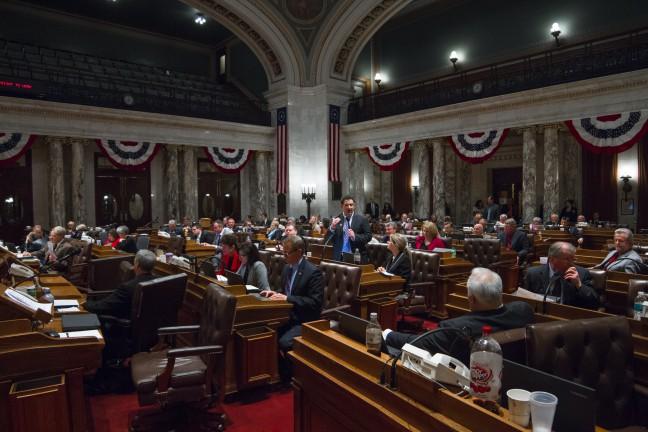For the first time since the 1930’s, a socialist caucus has re-emerged in the Wisconsin State Legislature. Two self-labeled “democratic socialists” from Milwaukee — Darrin Madison and Ryan Clancy — have partnered in an official move to represent a progressive political faction in the State Assembly this term.
Madison and Clancy both received endorsements from the Democratic Socialists of America’s (DSA) Milwaukee chapter in their bids for the Assembly, and formed a socialist caucus with other Democrats on the day they were sworn in, according to Wisconsin Public Radio.
This move may come as a shock to the average news hawk, given the current conservative makeup of the state legislature. But socialism has deep roots in Wisconsin politics.
Throughout the 1920’s, the Socialist Party formed the main opposition in the state legislature. Milwaukee served as the heart of the socialist politics of the state during this era. The so-called “sewer socialists” of Milwaukee transformed the city’s infrastructure, education, and public spaces during their extended time in power.
Failure of $2 million election investigation emphasizes need for government transparency
It wasn’t until FDR’s presidential ascension in 1932 that Wisconsin Democrats finally ousted the Socialist Party from opposition control, according to the Wisconsin Blue Book. Yet, the Socialists remained as mayors of Milwaukee until 1960.
The fledgling socialist caucus signals a new chapter of socialism in the state and a fundamental shift in voters across Wisconsin and the country.
In 2016, Vermont Senator Bernie Sanders — a democratic socialist — won the Democratic Party presidential primary in Wisconsin, defeating Hillary Clinton by almost 14 points. The open embrace of Sanders’ progressive agenda showed Wisconsin voters were hungry for voices that challenge the political establishment and fight for the working class.
Sanders campaigned on increasing the minimum wage, lowering prescription drug prices and Medicare-for-All — a public, single-payer healthcare system. According to polls from the Pew Research Center and the Kaiser Family Foundation, these policy platforms remain popular with the majority of Americans.
With the widespread popularity of progressive policies, the shock value of a socialist caucus forming in the Wisconsin State Legislature should not come from the taboo use of the “s”-word, but rather the fact a formal coalition of socialists have taken so long to reappear in state government.
Obviously, Madison and Clancy face an uphill ideological battle in the Assembly. Democrats are severely outnumbered in the chamber, holding just 35 of the 99 total seats, according to Ballotpedia. Accomplishing policy goals for Madison and Clancy will hinge on garnering support from less progressive Democrats and Republicans. But the two socialists see an opportunity to work on issues like infrastructure and paid leave, according to Wisconsin Public Radio.
In regards to their relationship with other Democratic lawmakers, Clancy and Madison make it clear they anticipate voting with the moderate wing of the party often. But they stress that any voting differences that may emerge come from their democratic socialist values.
Universal basic income presents viable alternative to welfare
In an interview with Wisconsin Public Radio, Madison outlined these values that separate him and Clancy from other Democrats. He cited defending the working class and improving infrastructure as large parts of these values.
Contrary to misconceptions about democratic socialism, Clancy and Madison emphasized their goals — not for revolution, but simply for enacting policies that will benefit those will less socioeconomic and political power. For Madison and Clancy, a socialist caucus presents a chance to analyze and view proposed legislation through the lens of democratic socialist ideology, without betraying their values to a wider Democratic caucus.
Unsurprisingly, Republican members of the Assembly were quick to criticize Madison and Clancy’s caucus formation. GOP Assembly Majority Leader Tyler August said that the socialist caucus is evidence of the state’s Democrats being “out of touch.”
But Madison and Clancy don’t believe they are out of touch. Clancy claims that a broken system has led many people to question the political establishment and the parties in power, propelling socialism into a position as a leading alternative.
Despite the small size of the new socialist caucus, the two Representatives are brave to fend off the familiar, recycled, centrist and conservative anti-socialist talking points. They also aim to call the policies that have become popular with so many Americans exactly what they are — socialism.
Voters in Wisconsin and other states are growing increasingly frustrated with the entrenchment of the two-party system and the lack of political options, according to the Pew Research Center — and it’s easy to understand why. The real value of the minimum wage hasn’t been this low since 1960 and the federal government has been plagued by avoidable shutdowns.
Communities of color face particular lack of welfare infrastructure amid rising mental health crisis
Last legislative session, Democratic Governor Tony Evers vetoed a record 126 bills during the 2021-22 legislative session — a sign of the severe inability of the Democrats and Republicans in state government to deliver on legislation for the Wisconsin public.
The reality is that both Democrats and Republicans continue to fail the American people. Though not uncontroversial, the presence of a socialist caucus in the State Assembly brings fresh, new perspectives to a perpetually deadlocked two-party system.
The time is right for Representatives Madison and Clancy to join forces and formally reclaim the stigmatized “s-” word. Doing so gives the pair a unique opportunity to introduce new ideas and policies, challenge the dysfunctional Democratic-Republican political binary and fight for the working class as generations of Wisconsin socialists have before them.
Jack Rogers ([email protected]) is a freshman studying economics and Chinese.




















